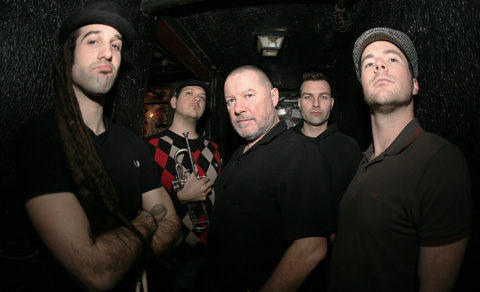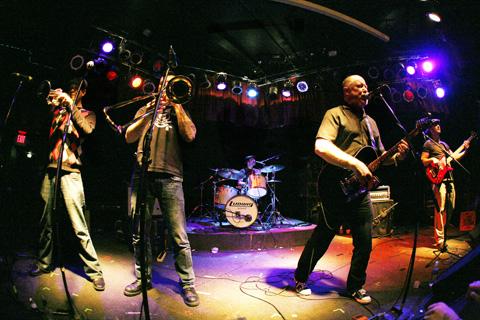30-year-old skank
By REYAN ALI | January 10, 2012

THIRD WAVE After a rough start in NYC in the early ’80s, Robert “Bucket” Hingley now calls the Toasters “the missing link of ska.” |
Despite its seminal role in the creation of first-wave UK punk, ska in America doesn't get no respect. At least not following a brief explosion of US mainstream popularity in the '90s. It doesn't matter that the Jamaica-born, England-bred genre was a close spiritual cousin of the pop-punk that was emerging with the likes of Rancid, the Offspring, and Green Day. No Doubt, the Mighty Mighty Bosstones, Goldfinger, and hordes of other ska acts broke through in that decade, but eventually the genre was seen as jokey and disposable — a style that existed in order to spiff up pop-punk by adding horns to the equation. When the spotlight faded, scores of American ska groups eagerly pushed the genre aside by ditching it entirely or playing down the brass that made them stand out in the first place. By 2000, ska in America had seen its day.New York City's the Toasters, who formed in 1981 and have weathered endless personnel changes since, are a reminder of what American ska was like before the rise and fall. The group took their name from the Jamaican performance art of "toasters" talking over songs like radio DJs (a precursor to hip-hop MCs), and eventually became a pioneering force in the States. Bandleader Robert "Bucket" Hingley, who grew up in England and Africa, was first exposed to ska at age nine when he bought a record containing Millie Small's sing-songy ska-pop tune "My Boy Lollipop." Stateside, he created the Toasters, and the group used the famous, now-defunct NYC venue CBGB to build their rep and a scene. "There was lots of music in New York, but no ska music," the 56-year-old guitarist and vocalist recalls, speaking by phone from his home in Valencia, Spain.The Toasters earned $22 for their first CBGB show. Even though Hingley figures that New Yorkers were familiar with ska, the initial feedback his band received was "mostly negative." Still, they kept on playing. Around 1982, they and other young ska bands began bonding with the hardcore scene for mutual benefit: Saturday became Ska Night at CBGB, Sunday Hardcore Night. This development meant good revenue for the venue and an opportunity for ska acts from Europe and other parts of the States to come in and find new audiences.
 |
Because of the circumstances, Hingley calls his third-wave act "the missing link of ska" — i.e., the connection between 2 Tone ska that came to the fore on that label in '70s and '80s England and the groups that later grabbed America's attention. The Toasters' 1987 album Skaboom! evinces their knowledge of the genre's roots: it channels the tuneful, hooky charisma of the Specials, Madness, and other 2 Tone acts while adding enough grit and flavor to take its sound one step beyond.Certain record labels, however, weren't so into it. In 1982, Hingley shopped around Toasters recordings, but they were rejected as "circus music." Hingley soon founded Moon Ska Records, providing an early home for his band and other burgeoning ska acts from America and beyond.
 Related
Related:
Occult Detective Club | Crimes, The punk business plan of Cock Sparrer, Kicking the habits, More 
- Occult Detective Club | Crimes
It's tough coming up with anything new in punk rock that isn't going to sound as if you were trying too hard to reinvent something that's as basic as it gets
- The punk business plan of Cock Sparrer
If you play in, work with, or write about bands, you've doubtlessly listened to dozens of wheeler-and-dealers pitch purportedly clever plans to "make it" in the music biz.
- Kicking the habits
Anyone familiar with Wagner's œuvre with the Raveonettes (who come to the Paradise next Thursday) should be surprised by the idea that, having created something awesome, he's ready to move on to something different.
- Review: Patti Smith's Just Kids
How do you get to be the Godmother of Punk? Pure dumb luck, for starters.
- Review: Public Image Ltd. at Royale
Terrifying, ridiculous, glorious
- Blackshaw's good vibrations
Blackshaw's low-key career has evolved as organically as one of his songs: at 28, the Londoner has amassed a body of instrumental guitar music that defies tidy categorization. What he does isn't really folk, jazz, or new age — and it's far too accessible to be mistaken for avant-garde.
- Punk buccaneer
Jonee Earthquake rumbles below the surface
- Review: Against Me! at Port City Music Hall
My sophomore year in college I met a girl named Erin. She had bleached blonde spiky hair, tattoos, and a lip ring. She had spent the previous year hitchhiking around the country and while I was attending outdoor arena concerts, she was at basement punk shows.
- Beth Ditto | Beth Ditto EP
Remember when Mary Beth "Ditto" Patterson was just a blues singer? The Arkansas-born belter used to wail punk blues for the Gossip - the trio who made her a star - like the second coming of Janis Joplin.
- Dinosaur Jr. at Port City Music Hall, June 20
Henry Rollins is the George Thorogood of punk rock. He has the appearance and credentials of someone bad to the bone, but in practice, he's pure establishment.
- Review: Perishable's Hedwig and the Angry Inch
If Alexander Platt's take on Hedwig and the Angry Inch were packed with any more energy, the bomb squad would have to be called out every night.
- Less

 Topics
Topics:
Music Features
, Ska, punk, music features, More  , Ska, punk, music features, the Toasters, the Toasters, Less
, Ska, punk, music features, the Toasters, the Toasters, Less 